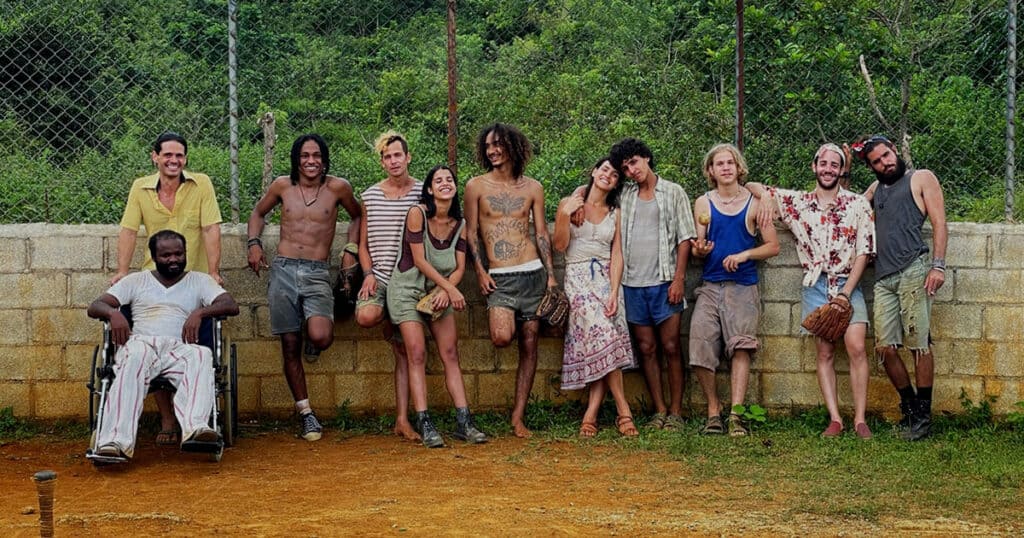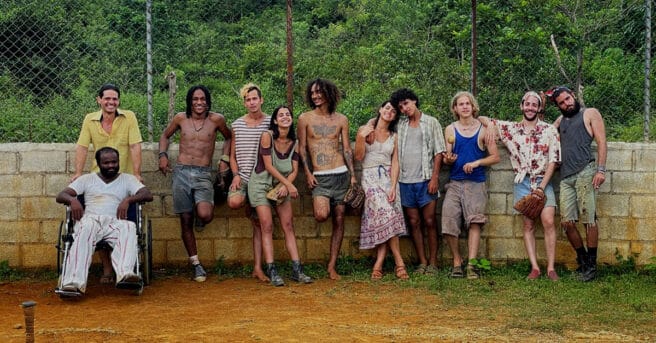

Plot: Inspired by actual events, Los Frikis is a coming-of-age story set in early 90s Cuba, where a group of punk rockers, in search of freedom, deliberately inject HIV to live at a government-run treatment home so they can create their own utopia.
Review: In 1991, when I was ten years old, I spent most of my days listening to Nirvana’s Nevermind on repeat, riding my BMX through local dirt trails, and recording episodes of MTV’s Liquid Television on VHS, hoping to catch another chapter of Peter Chung’s Æon Flux. All things considered, it was a breezy way for an American adolescent to grow up. Little did I know that people were suffering in other parts of the world, like Cuba, where a Marxist–Leninist politician named Fidel Castro pressed his tar and nicotine-covered thumb upon the necks of his people. How could I know that in 2024, a movie called Los Frikis would act as a wake-up call for how fortunate I was and open my eyes to a movement I never knew existed?
In the late 80s and 90s, the Cuban government banned rock music. You had to listen secretly, hoping to catch a chord or Nirvana’s “Come As You Are” while manually pointing an antenna at the sky from a rooftop without getting caught. Food was scarce, creating an epidemic of starvation as adults worked in the fields to afford meager portions while the youth killed and ate stray cats wandering the neighborhood. The American dream shined like a lighthouse in the fog overseas, and people risked their lives to get there.
When Paco (Héctor Medina) gets denied passage to the “Land of the Free,” he and his punk rocker friends inject themselves with HIV to live in a government-funded sanatorium, where some semblance of freedom and all the ice cream you-can-eat awaits. At the time, Paco knew little about HIV. Equating it to a cold while assuming a cure was around the corner was his mindset, and others followed his lead. Even his younger brother, Gustavo (Eros de la Puente), got in on the scam. But when a doctor falsely labels him as HIV positive, Gustavo joins Los Frikis, knowing he’s living a lie. He’s not only hiding from the Cuban government; he’s an outsider living in a community of outsiders.
The Peanut Butter Falcon directors Tyler Nilson and Michael Schwartz bring the story of Los Frikis to screens with incredible emotional depth, an adrenaline-filled, era-appropriate soundtrack, and beautiful cinematography from Santiago Gonzalez. Héctor Medina is a swirling mosh pit of emotions trapped inside a young punk’s body. He leads Los Frikis with authority, acting as their king in a semi-private kingdom of misguided subjects. Meanwhile, Eros de la Puente brings a corrupted innocence to the island with a stunning performance as Gustavo, a liar needing companionship and sanctuary. Gustavo enters the story as a near-silent protagonist, letting his soft facial expressions and huddled posture tell his story. As he adjusts to his new life with Los Frikis, he emerges from his cocoon, becoming a bullet with butterfly wings.
Adria Arjona (Blink Twice, Andor) steals the show alongside Medina and Peunte as Maria, an HIV-free matriarchal figure who tends to the group’s needs. She’s a warm breeze amidst a male-dominated cast, being one of the few women in an ailing community. Her chemistry with the Los Frikis punks is carefree and infectious, but when Maria is alone with Gustavo, Arjona takes her performance to another level. Arjona plays Maria with an air of mystery and a tender touch, presenting her as a firework with a long fuse waiting to explode. As she and Gustavo become closer, the guilt from Gustavo’s lie spreads, creating tension within him that gives his every moment a sense of overwhelming dread. As Gustavo became more ingrained in the community, my heart sank for him, knowing the truth would come out eventually. If you don’t have HIV, you’re a poser, and posers don’t have a home with Los Frikis.
In addition to directing the film’s slow boil of fear brought on by Gustavo’s lie, Tyler Nilson and Michael Schwartz celebrate the raw, healing power of music with style and reverence. Despite being infected with HIV and their health failing with each passing day, Los Frikis live like they never have inside their community. In many ways, they’re untouched by Castro’s influence, free to do as they please within the confines of their punk utopia. The sensation of freedom gave me a false sense of security as Los Frikis partied the days away. Then, people started getting sick—save for Gustavo.
The breakdown of the group lands an off-center punch to the story as beats become familiar and somewhat predictable. Even so, Tyler Nilson and Michael Schwartz treat these familiarities with care, making them impactful despite their clockwork nature. When someone leaves the film, you feel that loss, however they go.
Los Frikis is by far one of my most excruciating film-watching experiences. Because of the stress, I had to look away from the screen, cover my ears at least twice, and pop an Ativan halfway through. People with aversions to animal cruelty, be warned: Los Frikis is raw and unforgiving in its portrayal of the group’s dire circumstances and how animals play a role in their survival and evolution. Regardless of my being on edge for the film’s entirety, Los Frikis is a diamond in the rough of 2024’s indie output and stands as one of my favorite films of the year.
Most people experience untold hardships at some point, though some are more intense than most. Imagine living under such oppression that injecting yourself with HIV is seen as a solution to your problems. That scenario makes most of my trials appear small; my two open-heart surgeries, blood poisoning, and 30+ years of Crohn’s disease struggles be damned. From this moment forward, whenever I hear punk rock, I’ll think about Los Frikis. While some movies can anger you, Los Frikis makes you want to start a revolution. Viva la Los Frikis.
The post Los Frikis Review: an eye-opening mosh pit of a film! appeared first on JoBlo.

Leave a Reply